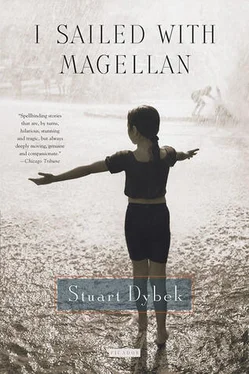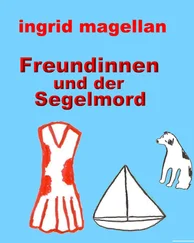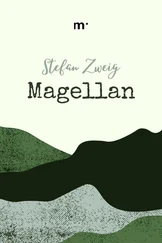“No mirror.”
“You don’t have a mirror? Don’t tell me — it’s at the Chink’s.”
“It’s in the alley.”
“That’s a novel place to keep it. I may be an exhibitionist but I’m not going to screw in the alley.”
“It’s broken.”
“Seven years’ bad luck, Joe. Poor unlucky bloke doesn’t get to watch the statues with their shameless minds.”
“ Allora !” Joe said. “It’s not that broke.”
He went down the back stairs into the alley. The mirror was still where he’d set it beside a trash can. April’s morning-glory dress was gone; some size-six bag lady must have had a lucky day. The mirror no longer appeared to be cracked, as if it had healed itself. It reflected an arc light. Nighthawks screeched. No one was playing an accordion in the alley, not that Joe thought there would be, but he could still hear it, a song he’d heard as a child, something about blackbirds doing the tango that his grandpa played on Sundays when he’d accompany scratchy 78s on his red accordion. Joe listened, trying to identify the open window from which the song wafted. Every window was dark. The music was coming from his window. He saw the flare of a lighter, and a silhouette with its head at an awkward angle, gazing silently down at him.
Marisol was still at the window, smoking a reefer, her back to him, when he returned to the room. “You didn’t get mugged. See, those new streetlights must be doing their job,” she said.
He propped the mirror against the wall.
“I’ll share,” she said, and exhaled smoke into his mouth. He felt her breath smoldering along the corridors of his mind. She handed him the reefer, and the crackle of paper as he inhaled echoed off the ceiling. “That paper’s soaked in hash oil,” she said. The accordion pumped louder, as if it tangoed in the next room. Lyrics surfaced in his mind and dissolved back into melody. “ E nell’oscurita ognuno vuol godere … in the darkness everyone wants pleasure.” When he opened his eyes, he could see in the dark. “L’amor non sa tacere … love can’t keep silent …” She was in his arms, and he smoothed his hands over her shoulders, down her spine, over her hips, lingering on and parting the cheeks of her sculpted ass.
“Have any oil?” she whispered.
“What kind of oil?”
“Like you don’t want me that way. Almond oil, baby oil, bath oil, Oil of Olay, Vaseline if that’s all you got.”
“Hoppe’s Number Nine,” he said.
“That’s a new one on me.”
He gestured with the reefer to the bottle in the ashtray next to the Old Spice on the bureau top. She picked it up and sniffed. By the lighter’s flame, she read the label aloud: “‘Do not swallow. Solvent frees gun bores of corrosive primer fouling and residue. Preserves accuracy.’ Jesus, Joe! Don’t you have some good, old-fashioned olive oil? What-a kinda Day-Glo are you?”
“Maybe in the kitchen,” Joe said.
Brandishing the lighter like a torch, she went to the kitchen. Joe waited on the bed, listening to the accordion playing with the mesmerizing intensity that marijuana imparts to music … “Love can’t keep silent and this is its song … la canzon di mille capinere … the song of a thousand blackbirds …” when Marisol screamed. “God, what am I stepping in? What’s leaking out of your fridge, Joe? You have a body in there?”
Wounded wing, how strange to fall from blue. Like a fish that suddenly forgets the way to swim. When men fly, they know, by instinct, they defy. But to a bird, as to a god, nothing’s more natural than sky …
Needing somewhere to think about the words forming to a nonstop percussion in his mind, not to mention needing a cold brew, Teo gimps out of daylight into the Zip Inn. A slab of sunshine extends from the doorway. Beyond it, the dimness of the narrow, shotgun barroom makes the flowing blue water of the illuminated Hamm’s beer sign on the back wall look like a mirage. The TV screen flickers with white static that reflects off the photos of the local softball teams that decorate the walls. Teo doesn’t remove his dark glasses. Zip, the folded right sleeve of his white shirt fastened with a yellow clothespin, stands behind the bar before a bottle of whiskey and raises a shot glass.
“Qué pasa, amigo!” Zip says, a little loudly given there’s just the two of them.
“Nada, hombre.” Teo is surprised to see him drinking alone in the afternoon, an occupational hazard of bartending to which Zip has always seemed immune.
“Knee acting up? Have one with me,” Zip says, filling a second shot glass.
“What’s the occasion?” Teo hooks his cane on the lip of the bar, carefully sets the bowling bag he’s carrying onto a stool, and eases onto the stool beside it.
“Today is Thursday,” Zip says, “and if you ask me, and I know nobody did, Thursday’s a reason for celebrating.”
“To Thursday,” Teo says. “ Salud !”
“Na zdrowie ,” Zip answers. He draws a couple of beer chasers.
“Let me get the beers,” Teo says, laying some bills on the bar. Zip ignores his money. After a meditative swallow, Teo asks, “TV broke?”
“No game today,” Zip says. “Giants are in tomorrow. You work Goldblatt’s?”
“No, Leader Store,” Teo says. He pushes a dollar at Zip. “At least let me buy a bag of pretzels.”
“I heard Leader’s is going under. Any shoplifters even there to pinch?” Zip asks, ringing up the pretzels.
“A kid in Pets trying to steal one of those hand-painted turtles. A pink polka-dotted turtle.”
“Give him the full nelson?” Zip asks.
“Only the half nelson. He was just a grade-schooler.”
“I think the dress disguise actually reduces your effectiveness, my friend. I mean, if there was a problem in my tavern, you know, say, theoretically speaking, somebody pocketing eggs—”
“The eggs are free,” Teo says.
“Then pretzels. Say I got a problem with some pretzel sneakthief, so I hire you and you’re sitting here, supposedly undercover, in a polka-dot dress wearing a wig and dark glasses and a cane and maybe smoking a cigar. I mean, you wouldn’t be fooling nobody. It might be a deterrent, but not a disguise. You might as well be sitting there in your secret wrestler’s getup. Whatever the hell it is.”
“Amigo, you really want to see the wrestler’s outfit?”
“Why not?” Zip says. “Liven things up. This place could use a little muscle.”
“You’d be disappointed. And, by the way, it was the turtle with the polka dots, not the dress.”
Lately, Teo has been stopping at the Zip Inn on weekday afternoons when the bar is mostly empty. Zip seems to know when Teo is in a mood to sit scribbling or simply to sink into his own thoughts, and he leaves him alone then, but other times they swap stories. Zip has told Teo hilarious tales of the world-record muskies he’s lost, and Teo, trying to make his story funny, too, told Zip how his knee was injured when he was thrown from the ring onto the pavement during an outdoor wrestling match.
“You mean like those masked wrestlers when they set up a ring on Nineteenth Street for Cinco de Mayo ?” Zip had asked. “What are they called?”
“Luchadores,” Teo told him.
“So, you’re a … luchador … with a secret masked identity?” Zip had sounded genuinely curious.
“Not anymore,” Teo had answered.
Now, from the bowling bag, Teo pulls the hem of the dress he dons occasionally as part of his store security job. It’s the dress they gave him when he began working for Goldblatt’s — blue paisley, not polka dots — and, contrary to Zip’s wisecracks, Teo has caught so many shoplifters that he’s begun moonlighting at Leader Store on his days off.
Читать дальше












